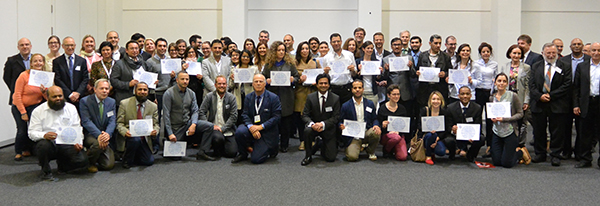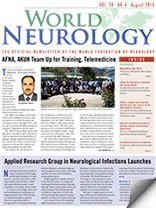By Wolfgang Grisold

Successful candidates and examiners.
The seventh European Board Examination in Neurology was held June 19 in Berlin, one day prior to the 1st Congress of the European Academy of Neurology (EAN) (http://www.uems-neuroboard.org/). There were observers from the World Federation of Neurology, including from Prof. Wolfgang Grisold.
The examination included a written part, with 80 multiple-choice questions (MCQ) and 50 extended matching questions (EMQ). These questions were developed by European specialist sections and were prepared by education standards in an extensive review process.
As a new feature, the candidates had to prepare an essay on a neurology-related public health or ethics related topic. This topic was presented by each candidate and orally discussed with the examiners. In addition, a critical appraisal of a neurological topic (CAT) had to be prepared and also was orally discussed with the examiners.
Topics of the essays were diverse and covered disease-based topics, such as driving with epilepsy or work- and health system-related topics. The CATs were mainly directed at diseases and therapies, and the presenters were expected to provide a qualified and thorough review on the topic chosen.
The examination was well organized and started with the MCQ examination. The rest of the day was spent with parallel sessions of EMQ testing and oral presentations. Two examiners who discussed the presentations and also asked questions in regard to the CAT took the oral presentations. Examiners were paired and selected with regard to language proficiency.
The results of the written examinations and the oral judgments were analyzed on the same day, and the results were presented on the same day.
Eighty-five candidates showed their interest, 72 sent submissions, 63 showed up, and 55 passed.
The following countries participated: Europe and Turkey (34): Austria, Belgium, Italy, Portugal, UK, Germany, Slowenia, Sweden, Greece and Turkey; Non-Europeans (29): Israel, Saudi Arabia, Egypt, Denmark, Pakistan, India, Iraq, Morocco, Tunisia, Cameroon and South Africa.
It was the seventh examination of the UEMS/EBN, now with the newly created EAN. This examination introduced the structured essay and CAT, which replaced the prior self-presentation. This new development added a new dimension to the examination, as the candidates were expected to give structured opinions on topics related to diseases and health as well as ethical topics.
At present, the European Board Examination is a sign of excellence, and it is hoped that increasingly European countries will accept the European Board Examination as equal to the national examination, or even replace their national examination with the European Board exam.
